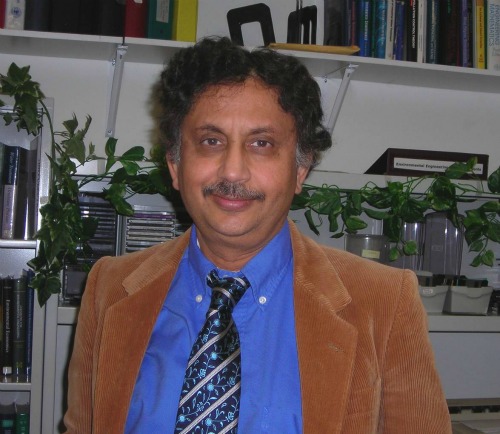SenGupta receives Fulbright award
Arup K. SenGupta, the P.C.Rossin Professor in the department of civil and environmental engineering and the department of chemical engineering, is the recipient of a Fulbright Environmental Leadership Award and will spend six months in the Center for Sustainable Technologies at the Indian Institute of Science in Bangalore, India, starting in January.
SenGupta’s project is titled “Mitigating Fluoride and Arsenic Crisis.” The award SenGupta received is called the Fulbright-Nehru Grant and is named for Jawharlal Nehru, who was the first prime minister of independent India.
SenGupta and Surapol Padungthon, a Ph.D. candidate in environmental engineering, have developed an adsorbent that is capable of removing both arsenic and fluoride. The adsorbent is reusable and takes advantage of the unique surface properties of metal oxide nanoparticles.
The Fulbright-Nehru Grant will enable SenGupta to collaborate with scientists and engineers in India to streamline the development of the adsorbent through laboratory and field work in areas of India whose groundwater is contaminated with fluoride or arsenic. The two contaminants, SenGupta says, rarely occur together.
Common—and deadly
Arsenic and fluoride are two of the most common—and most harmful—contaminants in the groundwater on which more than half the world’s population depends for survival. Arsenic and fluoride contamination are especially prevalent in Asia and Africa, SenGupta says.
Scientists estimate that as many as 500 million people on the two continents consume groundwater that is naturally contaminated by one of the two toxins, SenGupta says.
Chronic consumption of water with excessive levels of fluoride can cause pain and damage to bones and joints and other symptoms. The consequences of drinking water containing toxic levels of arsenic are more severe and include skin lesions, cancer and even death.
The World Health Organization (WHO) estimates that as many as 100 million people in India and Bangladesh drink well water containing toxic levels of arsenic. WHO calls the phenomenon the “largest mass poisoning of a population in history.”
The Fulbright award will also enable SenGupta to build on the success of an inexpensive filtration system he and his students developed, which removes arsenic from groundwater at the wellhead. The system has been installed in more than 200 villages in Eastern India since 1997. It is also in use in the United States, Hungary, Ecuador and Brazil. A patent for the system was awarded to SenGupta and Luis Cumbal ’05 Ph.D., who is now professor and director of graduate studies at the Army Engineering Polytechnic School in Quito, Ecuador.
For their work with the filtration system, SenGupta and his research team, which includes Lehigh students and faculty from Bengal University in India, received the Silver Award in the National Academy of Engineering’s 2007 Grainger Challenge for Sustainability.
Also in 2007, SenGupta and his Lehigh students won a $75,000 award from the U.S. Environmental Protection Agency’s P3 (People, Prosperity and the Planet) competition for a project involving the safe disposal of sludge containing high levels of arsenic.
Posted on:


